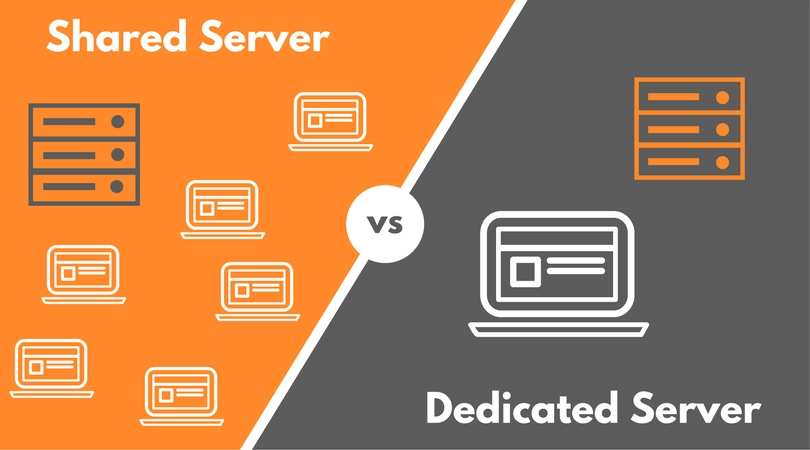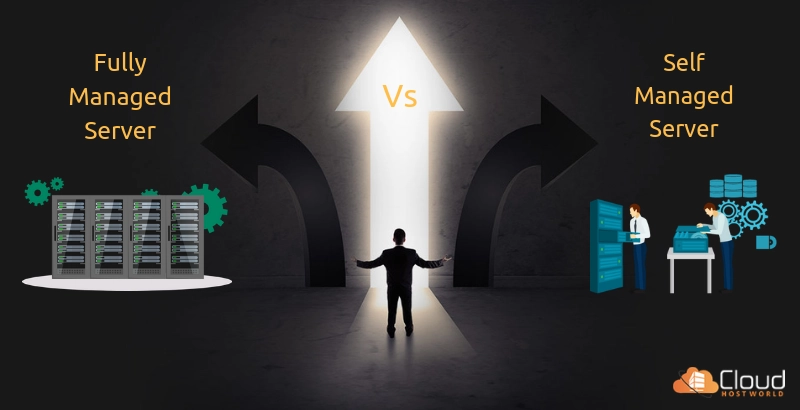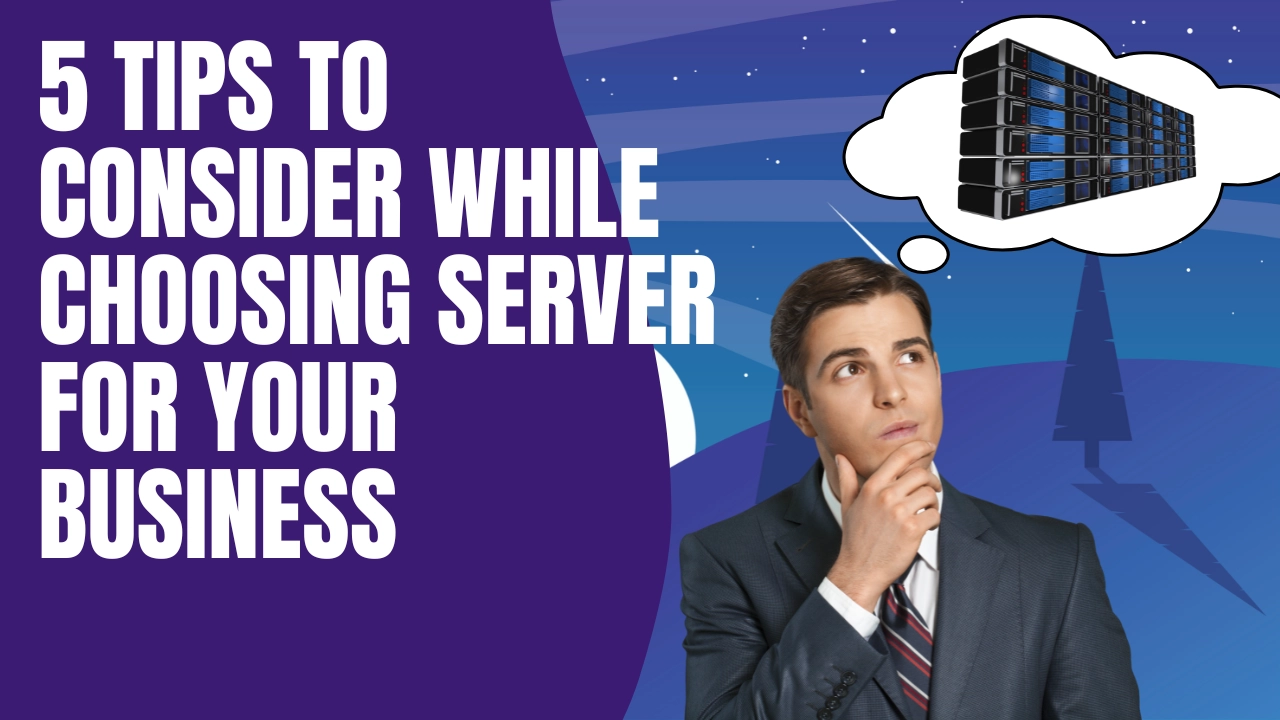Choosing the right server for your business is a critical decision that can have a big impact on your company’s bottom line. Although, finding the right server for your business can be tricky but these five things will help you to select the server best suited for you.

1. Choose the Right Type of Server Based on Your Needs
There are several types of servers available in the market and choosing the right one for your needs can be a daunting task. However, with a little research and a clear understanding of your needs, the process can be made much simpler.
The first step is to understand the different types of servers available. Generally, servers are classified as rack, tower and blade servers. All these physical servers can be further classified more into: web servers, application servers, database servers, file servers, etc. Each type of server has its own unique set of features and capabilities.
- Web servers are designed to host websites and provide web services.
- Application servers are designed to host applications and provide access to them.
- Database servers are designed to store and manage data.
- File servers are designed to store and share files.
Once you have a clear understanding of the different types of servers and their application, you can start to narrow down your options. Consider your budget, your business requirements and the features that are most important to you.
If you need a server for a small business, a web server or an application server may be a good option. If you need a server for a large enterprise, a database server or a file server may be a better option.
No matter what your needs are, there is a server out there that is perfect for you. With a little research, you can find the right server for your needs.

2. Understand the Difference Between Dedicated and Shared Servers
There are two main types of web hosting services: Dedicated and Shared. As the name suggests in Dedicated web hosting service, a dedicated server is assigned for your hosting requirements. In shared web hosting service, multiple resources are hosted on the same server. This is achieved by virtualization. Both have their own advantages and disadvantages, so it’s important to understand the difference between Dedicated and Shared servers individually.
Dedicated servers are just dedicated to a single client. This means that the client has full control over the server and its resources. Dedicated servers are usually more expensive than shared servers, but they offer more reliability and performance. For instance, when you’re buying a physical server, it is dedicated to only your business resources and you even have full control over the same.
If you are looking for a dedicated server then you need to choose a company with high-quality services. You should consider the following things while choosing a dedicated server provider:
1) Reliability – How reliable the service provider is?
2) Support – How quickly will the support team respond to your queries?
3) Price – What is the price of the server?
Shared servers, on the other hand, are shared between multiple clients. This means that each client has limited control over the server and its resources. Shared servers are usually less expensive than dedicated servers, but they offer less reliability and performance.
Shared servers are used by companies that require moderate or low computing power as compared to dedicated servers. They are also reasonable when it comes to commercials as compared to dedicated servers.
3. Know About the Different Types of Server Hardware Available in the Market
When it comes to choosing server hardware, there are a few different types of servers that you can choose from namely –
- Tower Server
- Rack Server
- Blade Server
The most common type of server is the tower server. Tower servers are designed to be placed on the floor, and they typically occupy more space in comparison to other types.
Rack servers are most utilized type of server hardware. Rack-mounted servers are designed to be mounted in a rack, and they occupy least space.
Finally, Blade servers are another type of server hardware. Blade servers are designed to be placed in a chassis and they are typically more compact than tower servers.
4. Find Out Whether You Need A Cloud or On-Premise Server
If you’re not sure whether you need a cloud or on-premises server, there are a few things to consider. First, think about what kind of applications and services you’ll be running. If you need to run high-performance resource-intensive applications, then a cloud server may not be right for you. On the other hand, if you’re just looking to run a basic website or blog, a cloud server will likely be sufficient.
Another thing to consider is cost. Cloud servers can be more expensive in a long run than on-premises servers, so if you’re on a tight budget, an on-premises server will be a better option. However, keep in mind that on-premises servers require more up-front investment, as you’ll need to purchase the server hardware and software.
Finally, think about your team’s skills and experience. If you have a team of experienced IT professionals, they may be more comfortable managing an on-premises server. However, if you’re not sure how to set up and maintain a server, a cloud server may be a better option, as it’s typically easier to set up and manage.
If you are looking for a dedicated server, then you need to consider whether you need a cloud or on-premise server. Cloud servers are hosted on remote data centers while on-premise servers are housed within the company’s premises. Both these options provide similar services with some minor differences.

5. Decide Whether You Want to Go for Managed Services or Self Service
A managed service provider (MSP) provides IT support services to small businesses. They offer a range of services such as network monitoring, security, backup and disaster recovery. On the other hand, self-service means that you will manage your own IT infrastructure. This includes installing software, managing backups and maintaining the IT hardware.
There are many factors to consider when deciding whether to go for managed services or self-service. One of the main considerations is the level of control you want over your IT infrastructure. If you want complete control and visibility over your IT infrastructure, self-service is the way to go. However, if you’re happy to delegate the management of your IT infrastructure to a third party, then managed services would be a better option.
Another key consideration is cost. Server maintainance services can often be more expensive than self-service, as you’re paying for the expertise of the service provider. However, self-service can also be costly if you’re not careful, as you can easily rack up bills for IT personnel, software and hardware that you may not need.
Finally, consider your own skills and knowledge. If you’re confident in your ability to manage your IT infrastructure, then self-service is probably the better option. However, if you’re not sure or you cannot devote time to manage your IT hardware, then managed services could be a better solution.
Final Words
To conclude, choosing a reliable physical server is an important part of starting and managing your business. When you’re looking for a server, you should consider all the options available to you and choose the one that best meets your business needs.
We hope you enjoyed our article about choosing a server for your business. With this knowledge, you can make the most of your business enhancement.
